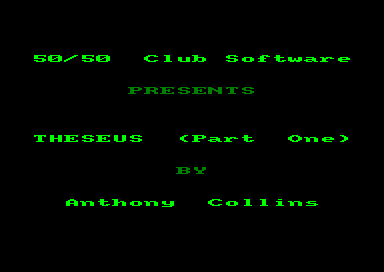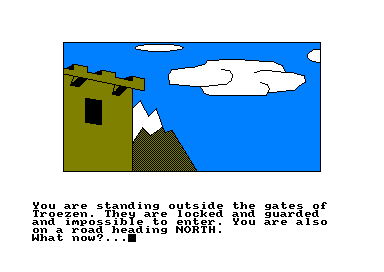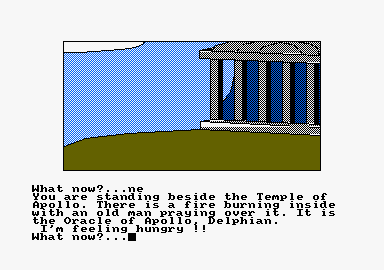The Pilg makes a point of trying to mention readers'games on a regular basis. This month I received a copy of Theseus from Anthony Collins in Birmingham, and I was particularly interested in it since it was the first game I had seen written using Incentive's GAC. Although Anthony's game is not yet complete, it still manages to show just what can be done using GAC The game looks and feels professional, and the graphics are sometimes well up to the standard we've come to expect from other more commercial outlets. However, the real nitty-gritty of a game is in the playing, and here Anthony's game shows a few weaknesses. First, the descriptions of the various objects are rather short and tend not to tell you much more about the objects concerned. A lamb is 'a small lamb', a tube is 'hollow and long', and so forth. It's worth giving more detail following an 'Examine object' command as this tends to keep the player interested and helps the atmosphere. The other problem, and this is one that many adventure designers get into trouble over, is that of dying, Anthony soon kills off his ; adventurer by starving him to death, and although the answer is , not far away there are at least four other death threats within the first fifteen locations. Furthermore, these threats are time-linked, in that entering a location too often (or remaining there too long) will result in your untimely demise. All this means that the first few times you play the game you are certain to die within a couple of minutes unless you're particularly clever, and this can be very discouraging for a player. I'm inclined to think that one should be able to explore at least twenty, locations of a game before getting into too deep water, though this is of course a Pilg-personal opinion. Scott Adams, for example, tries to get rid of you a dozen times before you've even hit the ENTER key! I look forward to seeing Anthony's game in its finished version the story-line (although lifted from Ancient Greek legends) is gripping and authentic. If the vocabulary were to be enlarged a bit (how about praying in the temple?) ana the beginning of the game made a bit more friendly, I have no doubt that it will be a reasonably popular game.    
|

